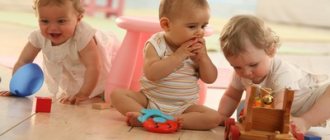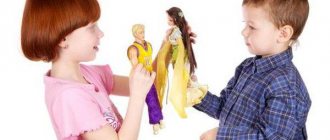Recommendations for educators during the period of adaptation of preschool children to the conditions of preschool educational institutions
Olesya Mironets
Recommendations for educators during the period of adaptation of preschool children to the conditions of preschool educational institutions
Everyone who works in a preschool institution knows that adaptation is a difficult and responsible period for all participants in the educational process. It’s hard for parents who see their child’s tears, it’s hard for children to get used to new conditions , it’s not easy for group staff either: children cry, cling, don’t let them work, and the teacher needs to have time , do everything according to the schedule, at least temporarily calm the baby down, let the rest take a break from the screams of the new ones. The adjustment period for children is always a difficult problem.
How to help a small child adapt to a new social environment so that adaptation is easy and painless?
Let's start with the fact that, oddly enough, adults adapt to this new environment than children. Therefore, one of the main tasks is often to provide assistance to adults. More often, children whose parents are very worried themselves experience anxiety, sometimes to such an extent that they do not notice the child’s emotional state and cannot encourage him. Usually in this case, parental fears and worries are clarified. It is important to remember that reducing anxiety in parents has a beneficial effect on the child. It is no secret that adults themselves can create an atmosphere of anxiety and fear, thoughtlessly expressing their feelings, very painful parting with the baby, and mistrust of teachers. Therefore, it is necessary to conduct conversations and consultations with parents; familiarize with the conditions of the child’s stay in kindergarten, regime, nutrition.
Parents need to provide assistance during the child’s adaptation period , explaining how relatives and friends should behave, and find out from them the characteristics of the child’s character and behavior.
Particular attention is paid to the study of the development of such social skills of the child as:
•self confidence;
•independence, initiative;
• ability to establish and maintain relationships with adults;
•emotional sensitivity;
. learned simple norms and rules of behavior.
It is important to determine the characteristics of family upbringing and find out:
•do the parents trust the child;
•whether they care a lot;
•is it strictly controlled?
•whether children's initiative is supported or suppressed;
•do parents easily come into contact;
• whether the child’s parents trust the teacher or try to control the situation of communication with him;
•are the parents frank;
•how parents are ready to cooperate;
• do they agree with everything or know how to defend their interests and point of view.
The leading role in the adaptation process belongs to the teacher .
1. During the adaptation period, you need to use flexibility in the regime processes: admit children first for 2 hours , then lengthen the stay, taking into account how quickly the child gets used to it.
2. Very often, in the first days of visiting kindergarten, the child strives for constant physical contact with the teacher and does not let him go. This seriously complicates the work of an adult who must pay attention to all children, organize routine moments, etc. The problem can become even more complicated if several new children . Therefore, the intake of such children should be carried out gradually, no more than 2-3 children per week.
3. Children need to be treated individually, especially those who are very sensitive, withdrawn, and cry a lot.
4. The teacher must be lenient towards the crying of children , responsive to the requests of their parents, attentive, calm, and capable of providing the group with a favorable emotional climate.
5. The teacher must be a good actor: be able to tell a fairy tale in a timely manner, sing a song, know many works of oral folk art: nursery rhymes, lullabies, in order to distract the child on occasion; use fun games as a surprise moment.
6. Collaboration with parents should be important. It is necessary to structure the work in such a way that the same demands are made on the child on both sides.
7. Visual information should be bright, rich, meaningful and relevant at the moment.
8. Children's work must be displayed for parents to see, so that they can see what the child is doing in the group and discuss progress with him.
9. If necessary, parents should be referred for help to other kindergarten specialists (psychologist, senior teacher , music director, nurse, etc.).
10. In the process of adapting a child to a preschool educational institution, I recommend that teachers use elements of bodily therapy (holding the child in your arms, hugging, stroking)
.
Periodically turn on low , calm music, but strict dosage and definition during playing are required.
11. The best cure for stress is laughter. It is necessary to create situations so that the child laughs more. Fun toys are used, unusual guests are invited - bunnies, clowns, foxes, etc.
12. It is necessary to look closely at the individual characteristics of each child and try to understand in time what is behind the silence, calmness, and passivity of some children .
Try to talk with parents every day, instill confidence in them, and dispel worries and concerns about your child. For each family, the acute period of adaptation is individual . It can have different durations. In this regard, they talk about three adaptation :
- easy adaptation - the child’s behavior returns to normal within 10-15 days;
— adaptation of moderate severity — within a month;
-difficult adaptation - requires from 2 to 6 months.
The teacher daily monitors the psycho-emotional state of children with whom he conducts play sessions and low-mobility games. In parallel with this, preschoolers with communication difficulties and increased levels of anxiety are monitored. In the future, individual, deeper work is planned with them and with their parents.
Parents of newly admitted students are invited to consultations, if necessary with an educational psychologist. Here they share the difficulties in their child going through the period of adaptation and raising him . The teacher gives recommendations , together with the parents, develops a strategy for behavior in a particular case and methods for raising the child .
During the adaptation period, information is posted on the stand with recommendations on how to learn to part with the baby and communicate with him during this period (for example, what not to say to him)
.
Recommendations for educators on how to adapt a young child to kindergarten
The teacher talks kindly to the baby in the presence of the mother, helps him change clothes, offers him an interesting toy, convinces the mother to play a little with the child, and plays with them. After the baby calms down, the mother tells him that she will leave for a while, but will definitely return soon.
For a small child, consistency in the environment is very important. He feels calmer when he is surrounded by things that are familiar to him. A favorite toy or something that reminds you of home will help ease the experience of loneliness and reduce the fear of separation from parents.
The most important thing for a teacher is to win the child’s trust and affection. You need to make him feel that he is understood and accepted for who he is. In order to better understand the child, the teacher himself needs to more often remember his childhood experience of separation from loved ones, his experiences and fears. This will help you endure fatigue or irritation from a child who is constantly crying and clinging to clothes with greater patience.
What can be done if the child does not let the teacher go and constantly calls for his mother? Here are some tips
• Don't ignore your child's words. When he endlessly repeats “Mom will come,” he is actually not sure of this, he is afraid that Mom will never come and is looking for confirmation of his greatest desire from an adult. Therefore, answer every such request from the child in the affirmative, helping him to believe that he will soon see his mother.
• After encouraging your baby, try to switch his attention to the toys, walk around the room with him, and look at what is in it. If your child becomes interested in a toy, play with it together and then try leaving him alone for a while, explaining, for example, that you need to wash your hands and promising to return quickly. Walk away for a few minutes and then return to your child. He will learn to understand that you are always there.
• If your child continues to constantly follow you, involve him in your activities. Sit him on a chair next to you if you are washing the dishes, ask him to help put away toys, offer to bring a book to read with other children, etc. By doing this, you will establish some distance between yourself and the child and at the same time you will with him .
• Pay attention not only to those children who clearly require it, but also to those who at first glance feel calm. Don't leave your child indifferent. Indifference and apathy are one of the signs of psychological discomfort and trouble in the emotional sphere. If a child looks around indifferently, clutching a toy to himself, and refuses to play, start playing not far from him. It is best if this is a story-based game, during which you can come up with character dialogues, sometimes turning to the child and gradually drawing him into the game. This game can be played with one of the children . Maybe such a game will interest the baby more.
• Don’t forget to play emotional games with your child, such as “magpie-crow”, “catch up”, “hide and seek”. The game of hide and seek is of particular importance for young children and performs a certain didactic function. It allows the child to practice mastering phenomena such as disappearing and reappearing, which can make it easier for him to wait for mom or dad to come.
• Organize with your baby interesting, calming activities with water, sand, story games, finger painting on large sheets of paper, use a table theater to show him scenes from a fairy tale, etc.
• Organize the same games between several children. You will still be in the middle of the situation, but with your help the children will be able to have fun playing with each other.
• During regime procedures, the individual characteristics of children , their habits and preferences should be taken into account.
• It is necessary to take into account all the individual habits of the child, including harmful ones, and in no case re -educate him .
• It is necessary to satisfy in every possible way the extremely acute need of children for emotional contact with an adult during the adaptation period. Affectionate treatment of the child, periodic stay of the baby in the arms of an adult give him a feeling of security and help him adapt .
• Playing with sand and water has a calming effect on children .
• Tell stories, sing lullabies, play calm, relaxing music during morning hours and before bed.
• Use playful methods to interact with children.
• Create a positive attitude in your child for the upcoming routine processes, using nursery rhymes, jokes, poems, and outdoor games.
Recommendations for educators on how to adapt an older child to kindergarten (when moving from one group to another)
A change of environment, a change of teachers is also stressful for the child and you need to help him psychologically; This must be done carefully so as not to discourage the desire to go to kindergarten. Each child is individual, and the readiness to move to a new group largely depends on his character and parental support.
The child is well aware that he has grown up, it is time for him to move to the older group, where he will be more interested, there will be new toys and new knowledge. Whatever the situation, every child needs support during this difficult period of life . The child begins his second adaptation to kindergarten .
It is important to explain to him the following:
“The new teacher treats you very well.”
“Even though the group has changed, the kids from your previous group came with you”
“You will have new friends, new toys”
“When you go outside, you will definitely meet your old teacher ”
“You and I can go to the previous group to say hello to the previous teacher ”
“If you don’t go to kindergarten, you won’t be accepted into school”
“You are already a big boy, and you should go to another group, new little children will come to the group”
Or come up with some phrases that will help the child painlessly part with the old group, with the old teacher and get used to the new.
WITHIN PERSONALITY-ORIENTED INTERACTION
Follow some rules when resolving children's conflicts:
• do not humiliate the child ( “greedy”
,
"evil"
);
• use tactful techniques to support a weak and offended child and measures to influence a stronger and more aggressive one;
• use indirect techniques that encourage the child to express his feelings and desires ( “Are you saying that you feel sorry for Katya? Let’s feel sorry for her”
);
• tactfully interpret the experiences of an offended child, helping children better understand each other’s condition and come to an agreement (“I think Katya is upset. You both want to play with the same doll. What should we do now?”);
• prohibit something only after other means of resolving the conflict have been exhausted;
• the prohibition must be formulated in a form that allows children to come to an agreement ( “I do not allow you to play with this machine until you agree”
); - distract the child’s attention with another toy, interesting activities, or offer him the same toy;
• organize a joint game with the toy that caused the conflict; — help children establish a priority in playing with the same toy.
TO PRESERVE AND PROVIDE A GENERAL POSITIVE ATTITUDE OF A CHILD TO HIMSELF IS THE MAIN STRATEGY OF ADULTS:
• if a child cannot cope with something, support his desire to achieve results; - do not evaluate the child (personality)
negatively, it hurts him painfully, constant reproaches suppress initiative, generate self-doubt, extinguish curiosity; - in case of failure, cheer up the child, instill in him confidence in his abilities: “You already know how to do so much. I'm sure you'll learn this too. See how it's done.
Try again";
• do not compare your child's failures with the successes of other children ;
• do not get into arguments with your child when he is stubborn and opposes himself to others; you need to help him cope with himself;
• often give the child the right to choose what and how he will do;
• educate yourself (an adult)
empathy: try to accept the child’s point of view, feel his condition.
A sign of the end of the adaptation period is the child’s good physical and emotional well-being, his enthusiastic play with toys, and a friendly attitude towards the teacher and peers .
Compliance with these recommendations adapt more easily , strengthen the reserve capabilities of the child’s body, and contribute to the process of early socialization.




